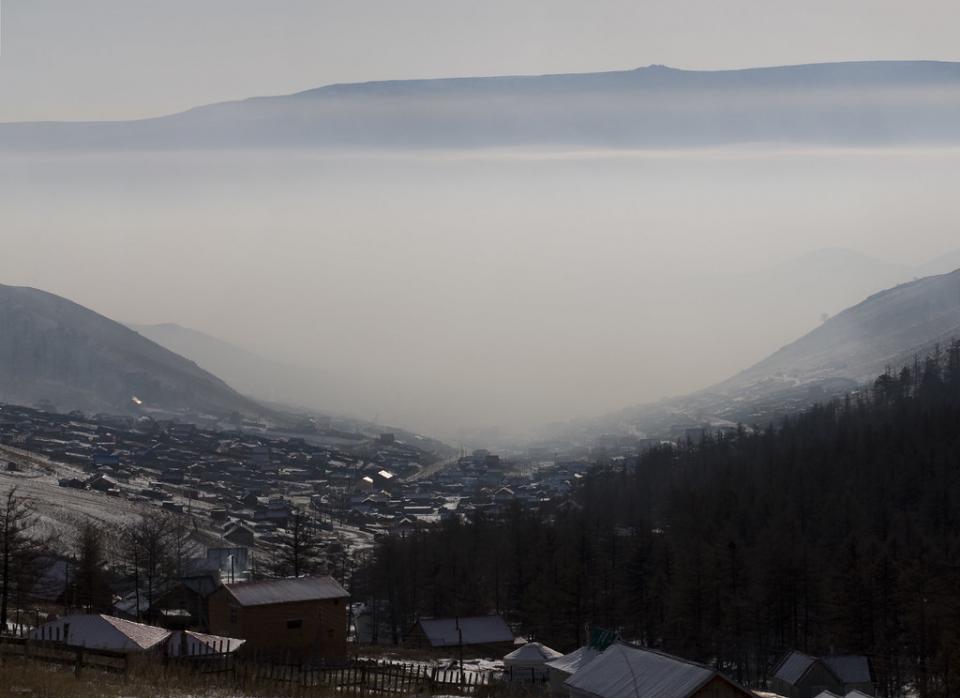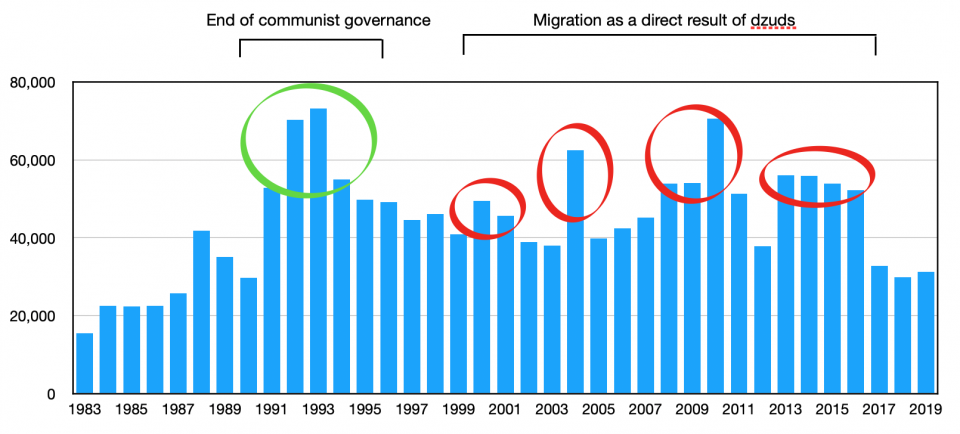The thawing of permafrost in Siberia represents the physical feedback loop of climate change in Asia. This paper argues that the capital of Mongolia, Ulaanbaatar, is experiencing social feedback loops, whereby climate change affects socioeconomic conditions that, in turn, further exacerbate climate change.

A view from a ger district on the outskirts of Ulaanbaatar.
A view from a ger district on the outskirts of Ulaanbaatar.
Accessed via Flickr on 1 September 2022. Click here to view source.
 This work is licensed under a Creative Commons Attribution-NonCommercial-NoDerivs 2.0 Generic License.
This work is licensed under a Creative Commons Attribution-NonCommercial-NoDerivs 2.0 Generic License.
In the twentieth century, the Mongolian society became divided into two parts: one urban group that lived in Ulaanbaatar and another that lived a traditional, nomadic life, moving across the plains with herds of cattle, horses, sheep, and goats. Nomadic life is always demanding, and it is especially hard during a weather phenomenon, locally called dzud, where summer droughts make it difficult to harvest a good supply of grass, which diminishes the quality and quantity of available fodder. After a frigid winter, livestock face a significant risk of dying due to insufficient fodder.
After the end of communist rule in Mongolia in 1990, many social regulations, including rural to urban movement and collectivized herding practices, were relinquished. Since then, the amount of livestock has increased fourfold, leaving pasturelands more susceptible to overgrazing. Compounded by global warming, this change further exacerbated the situation of nomads. Formerly considered a once-in-a-decade phenomenon, four dzuds struck between 1999 and 2010, resulting in more frequent and devastating dzuds. These changes have forced many nomadic pastoralists to give up their lifestyle and migrate to the capital to seek better opportunities and education.
From 1991–2020, the population of Ulaanbaatar almost tripled. The new inhabitants brought their traditions and gers (traditional yurts made of felt), resulting in a swarm of yurts surrounding the city. Today, more than half of the city’s residents live in ger districts. 85% of ger-district residents have no other centrally powered heating, so they resort to burning raw coal and wood for cooking and heating, adding substantially to the already severe air pollution experienced in Ulaanbaatar. The heating season in Mongolia usually lasts around seven months and during this period, the air-pollution concentration in Ulaanbaatar soars to a rate almost six times higher than the WHO Global Air Quality Guidelines for the protection of human health recommend as thresholds.

The number of registered migrants from rural to urban areas (mostly Ulaanbaatar) from 1983–2020.
The number of registered migrants from rural to urban areas (mostly Ulaanbaatar) from 1983–2020.
Source: National Statistics Office of Mongolia.
 This work is licensed under a Creative Commons Public Domain Mark 1.0 License.
This work is licensed under a Creative Commons Public Domain Mark 1.0 License.
The Mongolian economy is excessively dependent on coal. Currently, three combined heat and power plants are operating in Ulaanbaatar. All of them are coal-based and two of them are already past their retirement age. Should one fail, the ramifications would be catastrophic because a backup heating source has not yet been developed. A 2011 World Bank study concluded that 23.5% of cardiovascular diseases and 19.5% of respiratory diseases in Ulaanbaatar are caused by air pollution. A 2019 UNDP report calculated that air pollution caused an annual loss of productivity of $58 million, or 0.6% of the GDP, in 2016.
The Government of Mongolia (GOM) has made repeated efforts to reduce pollution. The most ambitious attempt was the National Program for Reducing Air and Environmental Pollution (NPRAEP), established in March 2017. Its goal was to reduce air pollution by 80% between 2016 to 2025. On 15 May 2019, a law banned the consumption of raw coal by anyone except the companies operating the thermal power plants and stations and substituted the remaining use with refined coal briquette. A subsequent report found that the PM (particulate matter) concentration of both PM2.5 and PM10 decreased by 46% and 55%, respectively, between 2015 and 2020.
However, in the medium term, the country still seems hooked on coal. Inside Mongolia, low-income residents have no other option but to burn coal. At the same time, the Mongolian People’s Party and foreign companies have heavily invested in coal and are reluctant to change course. Board members of the power plants actively lobby and obtain lucrative contracts, while left-wing politicians continuously fail to endorse past renewable projects. Consequently, the government plans to develop six new coal plants, including one in the capital, over the next ten years.

A topography map from above Ulaanbaatar with highlighted ger districts and three locations of the power plants (CHP).
A topography map from above Ulaanbaatar with highlighted ger districts and three locations of the power plants (CHP).
© 2022 Google.
Map data © 2022 Terra Metrics.
The copyright holder reserves, or holds for their own use, all the rights provided by copyright law, such as distribution, performance, and creation of derivative works.
Meanwhile, Mongolia has yet to tap into its vast potential for renewable energy. It averages 270–300 sunny days per year, with excellent solar radiation, ideal for photovoltaics. Shifting the energy regime toward renewables could simultaneously create sustainable jobs, drastically reduce climate change emissions, and decrease air pollution while reducing operational costs and bolstering the economy. However, renewable energy deployment requires a substantial upfront investment. Any prospect of a change in the energy regime recently suffered a heavy blow due to the Covid pandemic.
In the first half of 2020, the economy shrank by 10% primarily due to the lockdowns, economic shutdown, and decrease in the commodities trade. Covid-19 excessively affected the most vulnerable parts of the population, especially the low-income ger-district families. Many lost jobs and livelihoods, and these families had no choice but to use raw coal again. The GOM should be aware of the seriousness of air pollution and start implementing measures aligned with the residents’ needs. While policies such as the raw coal ban are crucial to ameliorating air quality, they do not tackle the root causes, which would require prioritizing policies that ensure economic opportunities in rural and ger districts.
Given that climate change facilitates the emergence of pandemics by destroying the habitats of potentially disease-carrying wild animals, this development forms yet another layer of the feedback loop. Historically, other countries have been responsible for producing the greenhouse gasses, a primary cause of climate change. The international community would be justified in providing assistance for Mongolia to shift toward renewable sources of energy.
How to cite
Batmunkh, Munkhbileg. “Climate Change and Pastoral Nomads: Feedback Loops in Ulaanbaatar, Mongolia.” Environment & Society Portal, Arcadia (Autumn 2022), no. 13. Rachel Carson Center for Environment and Society. doi:10.5282/rcc/9497.
ISSN 2199-3408
Environment & Society Portal, Arcadia
 This work is licensed under a Creative Commons Attribution 4.0 International License.
This work is licensed under a Creative Commons Attribution 4.0 International License.
2022 Munkhbileg Batmunkh
This refers only to the text and does not include any image rights.
Please click on the images to view their individual rights status.
- Ganbat, Gantuya, Tseren-Ochir Soyol-Erdene, and Batbayar Jadamba. “Recent Improvement in Particulate Matter (PM) Pollution in Ulaanbaatar, Mongolia.” Aerosol and Air Quality Research 20, no. 10 (October 2020): 2280–88. doi:10.4209/aaqr.2020.04.0170.
- Gombodorj, Ganchimeg, and Károly Pető. “What Type of Households in Mongolia Are Most Hit by COVID-19?" Sustainability 14, no. 6 (2022): 3557. doi:10.3390/su14063557.
- United Nations Development Programme. “Air Pollution in Mongolia: Opportunities for Further Actions.” UNDP, 18 September 2019. https://www.mn.undp.org/content/mongolia/en/home/library/air-pollution-in-mongolia--opportunities-for-further-actions.html.
- World Bank. “Air Quality Analysis of Ulaanbaatar: Improving Air Quality to Reduce Health Impacts.” Working Paper, Open Knowledge Repository, The World Bank Group, 2011. http://hdl.handle.net/10986/26802:








